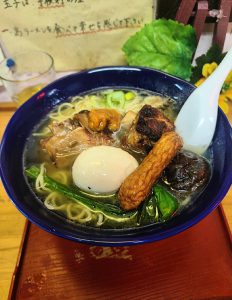🏝️神々は南の島に棲む――奄美洗礼行
- 2025.04.24
- 月刊芳美
🏝️神々は南の島に棲む――奄美洗礼行
すべての発端は、天皇を自称する男のブログだった。
真偽の怪しい歴史と、「本人に会えば何かわかるかもしれない」という、知的好奇心と酔狂の入り混じった動機が、我々を旅立たせた。目的地は徳之島――のはずだった。
しかし降り立ったのは奄美大島。
タクシーに乗り、「喫茶○○」の名を告げると、ドライバーの老人が笑う。「そこ、徳之島だよ。ここじゃない。」
地図をちゃんと見ていない旅人の末路は、こうして現実に立ち上がる。
が、そのときの私たちは知らなかった。
この“間違い”こそが、我々を「神の島」へと導く第一歩だったのだと。
ドライバーは語る。奄美王朝の御者の子孫、とはにわかには信じがたいが、彼の語り口には、どこかしら威厳と諧謔の混ざった響きがあった。
「鶏飯? あれは臭くてダメだ。わしゃ食わん。」
地元名物への強烈な否定。観光ガイドの真逆をいくそのスタイルに、私はむしろ惹かれた。
奄美FM「77.7」から流れる緩やかな島の空気の中、彼の提案で田中一村の旧居へ立ち寄る。
雨に濡れた木造家屋。窓越しに覗くも、中は暗く、人の気配はない。観光地というにはあまりに“生活臭”がありすぎる空間。
それがなぜか胸に迫った。芸術家の晩年の気配が、まだそこに沈殿しているようだった。
翌朝、知人が調べたラーメン屋を目指し、軽自動車を走らせる。
シャッター通りと化したアーケードの一角。貼り紙には「電話ください、5分で来ます」。
電話すると、原付バイクで軽快に現れる店主。
いささか不安を覚えるが、出されたラーメンは絶品だった。スープは滋味に富み、パパイアの漬物が妙に合う。
「究極の超スタミナラーメン(要予約・10,800円)」の話を振ると、店主は目を細めて語る。
「ハブです。眠れなくなりますよ。」
南の島のユーモアには毒があり、どこかしら神秘が宿る。
夜にはその店主、川端さんのナイトツアーに同行する。
暗闇の山道。野生のアマミノクロウサギ、アマミヤシギ。罠、マングース、そして駆除の現実。
自然保護の話にふと入り込む神聖さ。しかしそれも、川端さんの言葉で唐突に切り裂かれる。
「そんなにキリスト教に興味があるなら、今夜、洗礼、受けますか?」
まるで「ラーメン、おかわりしますか?」と言うような軽やかさ。
だがその響きは、不思議な説得力を持っていた。
夜の教会。ローブを着せられ、牧師夫妻に囲まれ、水の中へ。
ハレルヤの声に包まれ、後ろから沈められるその瞬間、私は思った。
これは、信仰というより――ただの体験ではない。
終わったあと、牧師は尋ねる。「クリスチャンネーム、どうしますか?」
私は問う。「つけるものなんですか?」
「あなたの名前がすばらしいのです。それでいい。」
型破りで、そして完璧だった。
この旅は「間違い」から始まり、洗礼で終わった。
けれど本当は、すべてが必然だったのかもしれない。
島の神々は、時に老人の声で語り、ラーメンの湯気から立ち上がり、原付の音に混じって現れる。
奄美。
この島は、何もかもがゆるやかで、深くて、
そして、笑えるほど神々しい。
🏝️
The Gods Reside on Southern Islands: A Baptism in Amami
It all began with a blog.
The author, a man who proclaimed himself emperor, spun tales of dubious history that somehow piqued our intellectual curiosity—or perhaps our taste for absurdity.
So we set out, supposedly for Tokunoshima.
But we landed in Amami Ōshima.
When we hopped into a taxi and mentioned a café name from the blog, the elderly driver chuckled, “That’s on Tokunoshima. This isn’t it.”
It was the moment our mistake took shape, quietly ushering us toward something far more mysterious than our original plan.
The driver claimed descent from the royal chauffeurs of the ancient Amami Kingdom. A grand claim, hard to believe—but he had a presence.
“Chicken rice?” he scoffed. “Smells awful. I never touch the stuff.”
The blunt rejection of a regional specialty was delivered with such panache, we couldn’t help but be amused. His was a kind of island wit—dry, disarming, oddly profound.
With Amami FM humming at 77.7, he detoured us to the old residence of Tanaka Isson, a reclusive painter.
The wooden house, soaked by rain, was dim and quiet. Peeking in through the windows, we saw no exhibits, no signs of life—just stillness.
Yet something about it gripped us. As if the traces of a forgotten genius still hung in the air, uncurated, untouched.
The next morning, we set out to find a ramen shop my friend had looked up.
The arcade street it sat on was mostly shuttered, hushed like a ghost town. A handwritten note read: Call us. We’ll come in five minutes.
We did. And five minutes later, the owner arrived—on a scooter.
Any doubts we had vanished with the first slurp. The ramen was sublime, the broth quietly complex, paired perfectly with papaya pickles.
We asked about a curious menu item: “Ultimate Super Stamina Ramen – 10,800 yen (Reservation Required).”
He squinted and smiled.
“That one has habu. A snake. You won’t sleep after eating it.”
There it was again—that island humor, tinged with danger and mysticism.
That night, the same ramen master, Mr. Kawabata, offered to take us on a wildlife tour.
Under the darkness of the mountain road, we saw wild Amami rabbits, forest rails, and the traps set to catch invasive mongooses.
Nature preservation, it turned out, was not serene but visceral. Beautiful, yet brutal.
And then, out of nowhere, he asked:
“So… would you like to be baptized?”
The tone was casual—like offering us a refill of noodles. But something in the way he said it felt strangely… inevitable.
That night, at a tiny church, I stood in a robe as a pastor and his wife surrounded me.
They lowered me into water, voices murmuring Hallelujah.
It was solemn, surreal—yet not religious in the traditional sense. More like a rite of passage. A moment outside of time.
Afterward, the pastor asked, “What name would you like for your Christian self?”
I hesitated.
“Do I need one?”
He smiled. “Your name is already beautiful. That will do.”
Perfect. In its own, island way.
This journey began with a mistake and ended with a baptism.
But maybe it was all meant to happen—misstep by misstep, laugh by laugh.
On Amami, the gods don’t thunder. They whisper.
Sometimes in the voice of an old taxi driver.
Sometimes in ramen steam.
Sometimes through a scooter echoing down a silent street.
Amami.
Where everything is soft, and deep,
And sacred—
In the most ridiculous, glorious way.
